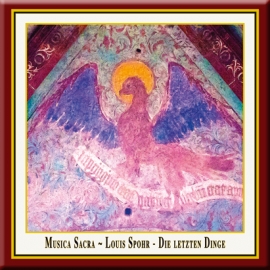
5 stars out of 5 stars
Customer Votes on EMusic

Spohr'’s second oratorio concerns both:
the Apocalypse and the Last Judgement
This was Spohr’s second oratorio and was written in Kassel between 1825 and 1826. The libretto, in two parts, was by Johann Friedrich Rochlitz (1769-1842) and concerns both the Apocalypse and the Last Judgement. The overture is a powerful utterance, finely put together, and orchestrated adeptly. The choral entries are often arresting, and the accompanied recitatives show awareness of oratorio antecedents but are sufficiently flexible to convince on their own terms. At its best the work impresses through a felicitous sense of word-setting and layering; the choral responses are indeed sensitively shaped. The fourth movement, with a tenor solo and chorus, calls for a repeated ‘Heilig’ and the chorus’s soft, reverential repetition vests the music with great reflectiveness and elegiac quality. Then too Spohr doesn’t stint the opportunities for some good old-fashioned fugal development. Its employment halts the narrative somewhat but is certainly incisive; that in the seventh section is very definitely reminiscent of Handel. Spohr shows in the Sinfonia introduction to the second part just how well he wrote for orchestral forces and in the Babylonian chorus (No.15) demonstrates a sure instinct for the dramatic crest of a movement. In the concluding fugal Hallelujah section he reprises the kind of Handelian statements he’d earlier established in the first part of the oratorio. There are some Mozartian touches here and there, more stentorian Beethovenian ones too, in addition to the sometimes pervasive Handelian aspect. ...
Jonathan Woolf, Musicweb International - www.musicweb-international.com

Qobuz Hi-Res Audio
Awarded by Qobuz with the "Hi-Res Audio" March 2012.
Qobuz

The listener is engrossed in what is going on from first note to last
This enterprising German label has recently served up some wonderfully crafted chamber and choral performances and this discovery by Spohr is no exception. Apparently 'The Last Judgement' (Die letzten Dinge - 1825/6) was an extremely popular oratorio in its heyday but it unfortunately fell by the wayside and is little heard today. Spohr treats the text with reverence and respect and although the music rarely rises above the mundane, the soloists and Budday ensure that the listener is engrossed in what is going on from first note to last. This is a worthwhile revival from the Spohr canon which deserves much wider currency.
Gerald Fenech on Classical Net











